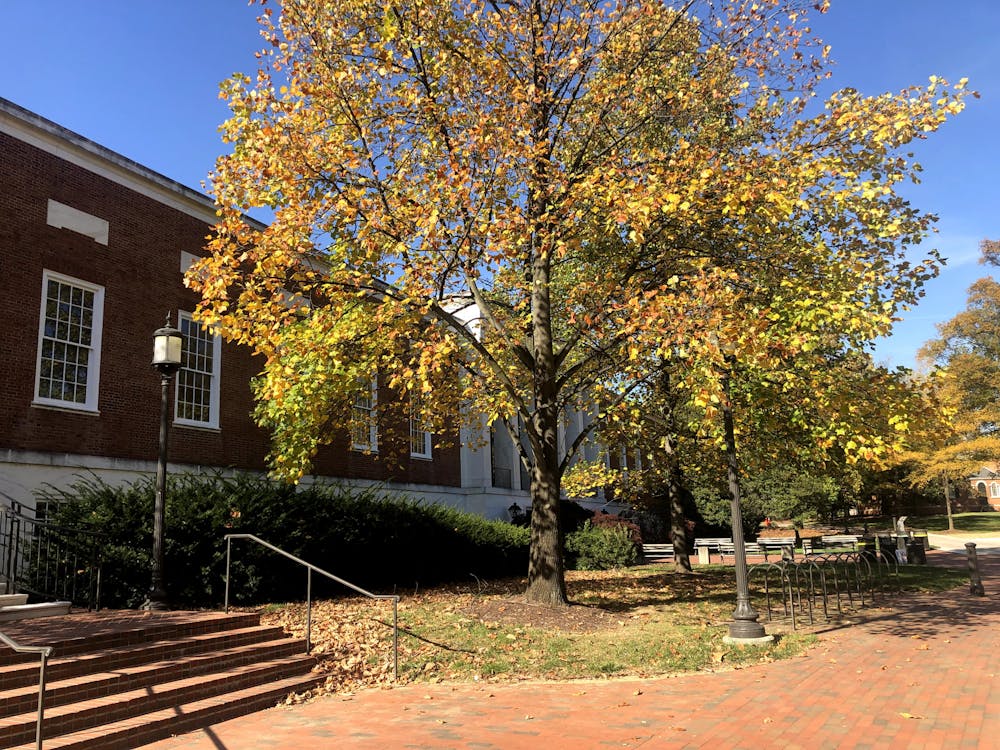The Student Government Association (SGA) discussed bringing electric scooters to campus at its weekly meeting on Tuesday, Nov. 17.
Dave Reed and Daniel Phonelath, representatives from the electric scooter-sharing company Spin, gave a presentation outlining a possible partnership between their company and the University. Spin currently provides electric scooters to over 20 college campuses and 70 cities, including Baltimore, offering locals an alternative way to get around their neighborhoods.
If the University partnered with Spin, 10 to 15 electric scooter charging and parking hubs would be installed on campus. Students would be able to use these scooters either for a fee or with University subsidies.
Currently, electric scooters are not allowed on campus. When electric scooter services were first introduced to Baltimore in 2018, they were initially controversial. Since then, they have become more normalized and are currently used off-campus by many students as an alternative to public transportation and ridesharing apps.
Senior Class President William Cho pointed out that students might not have much use for electric scooters on campus.
“I would imagine that the reason why the administration didn’t respond is because our campus is very small. You can walk from the two polar ends of it in 12 minutes,” he said. “A lot of our students live off-campus, and that’s where the need for Spins would be... Those charging ports would be better located off-campus.”
Reed clarified that Spin has not had any serious engagement from the University yet despite sending several introductory emails.
He argued that this relationship would be beneficial to the University because, aside from providing scooters to students, advertising on the charging hubs would provide extra revenue to SGA and the University.
“This is a no-cost investment for Johns Hopkins and the student government. It actually is a revenue generator,” Reed said. “Any advertisements would be University-approved. We would also yield about 25 to 30% of the screentime to University messaging.”
Reed argued that installing charging hubs would limit the clutter of having electric scooters on campus and would also be more environmentally sustainable.
Senior Class Senator Ananya Kalahasti noted that the campus is not very conducive to scooters.
“There are very few people who don’t have to climb or descend at least one flight of stairs to go between two classes,” she said. “To take a scooter you’d effectively have to go all the way around instead of just taking the fastest path between classes.”
Senior Class Senator JJ Tie also expressed concerns about introducing electric scooters during the COVID-19 pandemic.
“There’s still a lot of uncertainty involving the pandemic and the public health situation,” she said. “What if we go fully online last minute? What is Spin doing to ensure public health in terms of sanitizing the scooters?”
Reed emphasized that Spin is doing what it can to keep its scooters COVID-19-safe.
“Anytime that someone from our team... is servicing a scooter, they’re sanitizing it,” he said. “We’ve got a lot of enhanced protocols as compared to pre-pandemic.”
Kalahasti believes most students would not bother to use scooters even if they were provided.
Reed argued that despite these issues, Spin could still be a useful resource to students on and around campus.
“Our goal is not to replace walking trips. Our goal is to be a complement to existing services,” he said.
Reed explained that while Baltimore does not allow charging hubs to be placed on public property, off-campus hubs could potentially be placed if private property space was provided.
Junior Class President Nathan Mudrak pointed out that while scooters may not work well at Homewood Campus, other University campuses could use them.
“We are all coming from the Homewood Campus. When we think of Hopkins, there are other campuses, some of which might be more amenable to scooter use,” he said.
Cho also worried that price barriers would inhibit some students from using the service.
“I’m very interested in the subsidizing aspect in terms of accessibility for people from different socioeconomic backgrounds. Not all students have the ability to ‘Spin,’” he said.
Cho stressed that if a partnership was established, steps would have to be taken to make the scooters affordable and accessible to the entire student body.
Junior Class Senator Megan Chien said that she liked the idea of electric scooters, especially if they were able to help students off-campus. She noted that they could be very helpful to students with limited mobility.
“As someone who has torn their ACL, it is very difficult to get to class if you can’t walk anywhere. I used to have to call security to drive me to my classes, and I even ended up dropping a class because I just couldn’t make it, physically,” she said.
Executive President Sam Mollin suggested setting up a meeting between Spin, SGA and administrators to discuss how a partnership might work.
During the meeting, Freshman Class President Kobi Khong also presented a special forum proposal in response to accusations that the Delta Phi (St. Elmo’s) fraternity is drugging students at parties. Khong stressed the need to have a formal discussion about Greek life’s disregard for University policies.
113 students signed a petition in support of holding the special forum. However, since these signatures were collected improperly and there was no way to prove that they were authentic, the proposal was tabled.
In an email to The News-Letter, Mollin explained that SGA was working to verify the signatures.
“We are taking steps to verify all signatures and ensure we get a vote on this proposal as quickly as possible,” he wrote. “Over one hundred students expressed a desire to have this forum, and we take that seriously.”
According to Mollin, if the signatures are verified in time, SGA might hold a brief general body meeting over Thanksgiving break to vote on the special forum.





